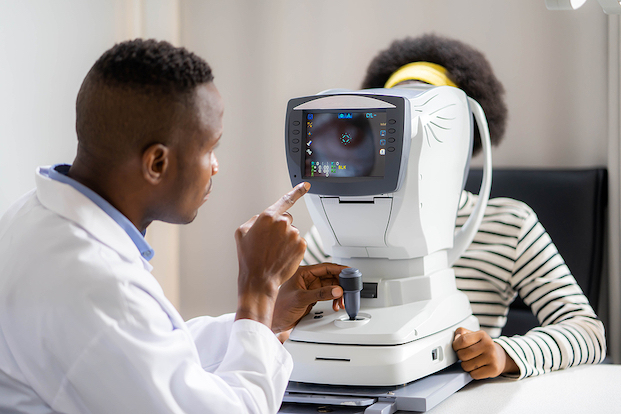National Eye Exam Month is Here: What to Know
August 9, 2023
August is National Eye Exam month. When was the last time you got your vision checked?

August is National Eye Exam Month! Are you one of the 11 million people who need vision correction? If you’ve never been to the eye doctor, you could have vision trouble and not know it.
Due to the aging population in the United States, the number of visually impaired and blind people is estimated to double by 2030, but some of that may be preventable. Regular eye exams can help you save your vision and correct vision problems that might lower your quality of life.
How Often Should You Get An Eye Exam?
Your age, whether you wear eyeglasses, and your risk level for various eye conditions all impact when you should get an eye exam.
Ages 0-4
Most babies receive an eye exam from their primary care doctor when they come in for their regular physical. Additional attention from an eye doctor is needed if your baby shows signs of a problem – such as eyes that remain crossed after 4 to 6 months of age.
School Age Children
Most children should get an eye exam before their first year of school. Vision trouble at school can lead to various academic and even social problems. Catching vision trouble in its early stages can help your child have their best chance at success in the classroom.
Adults
The Mayo Clinic recommends that adults without vision issues get an eye exam around age 40 and then, as recommended by their eye doctor. Adults should have regular eye checkups every year or two starting around age 60. By age 60, adults are at higher risk for vision problems like glaucoma. Going to the eye doctor regularly can help catch these problems and prevent blindness.
People who wear eyeglasses should get an eye exam every year or two to check for changes in their prescription.
At-Risk People
Some health conditions, like diabetes, can increase the risk of vision trouble and diseases like glaucoma. See the eye doctor more often if you have the following:
- A health condition that puts you at greater risk for vision trouble
- You are taking medication that could increase your risk for eye conditions
- You have a family history of problems like glaucoma
Why Is It Important to Get Periodic Eye Exams?
There are many reasons to get periodic eye exams, including:
- Safety. Some people with vision problems aren’t even aware of their poor vision until they visit the eye doctor. Poor vision can impact the ability to drive, walk safely in high-traffic areas, and complete everyday tasks like cutting up food. Getting your vision checked and corrected can help you avoid a serious accident.
- Success at school and the workplace. Blurry vision is a common problem that can impact a child’s ability to see the whiteboard and an adult’s ability to function in the workplace. Getting your vision corrected can help you see correctly and clearly.
- Some eye conditions have no symptoms in their early stages. Diseases like glaucoma often have no noticeable symptoms until your vision starts to degrade. Seeing an eye doctor is the only way to catch this problem in its early stages.
Protect Your Vision: See the Eye Doctor
Good quality of life starts with good health. Getting your eyes examined can help. See your eye doctor to protect your vision.